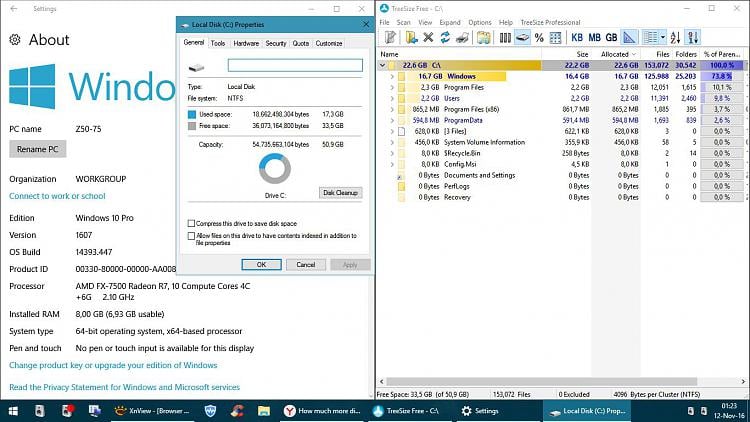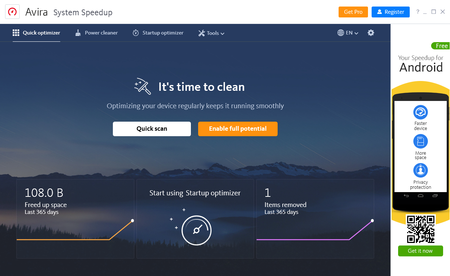- Free Up Memory Windows 10
- How To Clean Up Ram On Windows 10
- How To Clean Up Memory In Windows 10 Using
- How To Clean Up Memory On Computer
- Free Ram Cleaner For Windows 10
Windows 10 virtual memory
Windows 10 is at its finest state where you can blindly install it hoping for the best Windows operating system yet. If you just installed the Windows 10, you might want to learn memory management to reduce performance and lagging issues. Here let’s see how to tweak virtual memory in Windows 10 and other memory related settings to fix such issues.
- Open Task Manager with Ctrl + Alt + Del keys. Go to Task Manager, open Processes tab and the list displaying all your running tasks. Here you see the usage according to CPU, Memory, Disk, and Network. Choose the tasks consuming high CPU percentage and click End Task.
- Here’s how to clear your cache in Windows 10. Clear the Temporary Files Cache with Disk Cleanup To clear the temporary files cache, enter “ Disk Cleanup ”” in the Windows search bar found in the bottom-left corner of the desktop. The Best Tech Newsletter Anywhere.
Also, if a currently open program is taking up too much space in the system memory, the system will shift several of the least used memory items to an area in the hard drive known as the Paging File. Windows sets the default paging file size. But you can change it as per your requirements. Press Windows Key + R.

How to Adjust Windows 10 virtual memory settings:
Virtual memory is more like a physical RAM which is being used when the standard RAM runs out of usable space. This might have no meaning to the newer computers which have loads of RAM built-in. But helpful to older machine or machines having not enough memory. It improves the system stability and improves performance, and the same time it saves programs from crashing when the RAM is almost full. Windows 10 also uses the Physical memory profile to handle things if were out of memory.
Windows 10 can take care of itself depending and according to your computer. To fix any performance issues and to make the system more stable you need to fix the Windows 10 virtual memory management, follow the below steps.
1. Click on the Start icon or press the Windows key, and go to the Settings.
Free Up Memory Windows 10
2. Start typing ‘performance‘ and choose the appearance and performance of Windows from the results. Or you can directly search ‘Performance‘ in the start menu search bar.
3. A window will open, switch to the Advanced tab, and you’ll see a Virtual Memory section, click on the ‘change‘ button. In the same window, you can see values at the end, those are the initial, recommended and the current value of virtual memory. You need to read that.
If you see that the current Allocated value, is less than Recommended value. Uncheck the “Automatically manage paging file size for all drivers” Then, select “custom size” and make changes according to these.
- In the initial size field enter the recommended memory value (find at the bottom of the box).
- In the maximum size field enter an amount higher than recommended value. But don’t make it to higher that could not be helpful and you might experience a worse situation.
- Once you are satisfied click ok to save your new Windows 10 virtual memory settings.
If you’re not sure about how virtual memory in windows 10 can affect its performance, we suggest you to make changes and see results accordingly.
More Windows 10 Tutorials and resources
Like every operating system, Windows also stores different kinds of cache files on the hard drive. In simple words, cache files are temporary files that are stored on the memory to make it easier for you to access frequently used data. The cache data utilize lots of hard drive space of your computer. Deleting cache files is necessary for the smooth running of the system. Cache memory is responsible for various kinds of computer problems, including slow processing speed, slow startup, lag or hang, application responding, and many others. If you don't know how to clear memory cache on your Windows computer then, the solution to your problem is here. Here in this post, we will talk about How to clear memory cache on Windows computers.
5 Ways to Clear Memory Cache on Windows 10/8/7/Vista/XP
It is necessary to clear cache the memory to fully utilize your CPU power. Cache memory causes lots of problems by occupying a huge amount of computer RAM (Random Access Memory). That's why it is always recommended to clearing memory cache from your Windows computer to get optimum performance. Cache memory is something that is really useful to give you better performance. It helps the application to load faster as compared to load the app without cache data. Here below are some methods that will help you to clear memory cache in Windows 10/8/7/Vista/ and XP.
Method 1: Create Clear Memory Cache Shortcut
This is one of the easiest solutions to clear memory cache on the Windows operating system. This method is completely free; you don't have to install any third-party paid tool to clear the memory cache. Below are some steps to clear memory cache on Windows.
Step 1: First of all, you have to turn on your computer and right-click on the desktop.
Step 2: Here, you will have a couple of options. Click on 'Shortcut' under the New option.

Step 3: Create a Shortcut wizard will appear, you have to click Browse to locate the directory. Or you can simply type '%windir%system32rundll32.exe advapi32.dll, ProcessIdleTasks' without quotes on the text field of 'Type the location of the item'.
Step 4: Once the above process is completed, you have to click on 'Next' button to proceed to the next step.
Step 5: Now, you have to type a name for this shortcut. Here, we are typing 'Clear Unused RAM' and hit on the 'Next' button.
Once the shortcut is created, switch to the desktop and double-click on the shortcut to clear memory cache on Windows.

Method 2: Clear General Cache
Disk Cleanup is an integrated feature of Microsoft Windows that enables the user to clean unwanted files. Getting engaging with this feature, you can remove temporary files, unwanted files, preview windows installation files, and much more. You just have to choose the disk and start the deleting process. Here below are steps to clear the memory cache using disk cleanup.
Step 1: At the first step, you have to click on the 'Start' button and type 'disk cleanup' in the search field and hit the 'Enter' button.
Step 2: Now, Disk Cleanup: Drive Selection dialog box will appear. You have to choose the drive from where you would like to clear the memory cache.
Step 3: Now, click on the 'OK' button. It will start the scanning process and shows you how much space is occupied by the cache.
Step 4: You have to tick the checkbox which you would like to clean. If you want to clean system files then, you can click on the 'Clean up system files' otherwise, hit on the 'OK' button at the bottom of the window.
Step 5: Once the above process is completed, you can click on 'Delete Files' if prompted. It will start deleting cache files from places including recycling bin, Thumbnails, and many other places.
Method 3: Clear App Data File to Clear Memory Cache
Step 1: At the first step, you have to click on the 'Start' button or hit on the 'Windows' key and click on 'Computers' to open My Computer.
Step 2: My Computer window will appear; if you don't see My Computer, then manually type 'My Computer' in the start and hit the 'Enter' button.
Step 3: Once the above process is completed, you have to click on the 'Organize' tab in the top left corner of the window.
Step 4: Then, choose 'Folder and search options' under the organize drop-down menu.
Step 5: a Folder options dialog box will appear with 3 tabs; click on the view tab.
Step 6: Now, you have to click on 'Show Hidden files, folder, and drives' radio button under the 'Hidden files and folders'.
Step 7: Click on the 'OK' button at the button of the window.
Step 8: Once the above process is successfully completed, you have to open the hard disk where windows are installed.
Step 9: Now, you have to open the 'Users' folder by double-clicking on it. Then, click on the folder with an administrator account.
Step 10: You have to locate the 'AppData' folder and open it by double-clicking and open the 'Local' folder.
Step 11: Now, you have to select the 'Temp' folder and open it.
Step 12: Remove the read-only permissions from the Temp folder.
Step 13: You have to select all files that are placed in the Temp folder. You can press 'Ctrl' + 'A' to select all files.
How To Clean Up Ram On Windows 10
Step 14: Once the files are selected, Press 'Shift' + 'Delete' button simultaneously to permanently delete all temp files.
Method 4: Delete Internet Explorer Files to Clear Memory Cache
Step 1: First of all, click on the 'Start' button and type 'Internet Explorer' in the text field and press the 'Enter' button.
:no_upscale()/cdn.vox-cdn.com/uploads/chorus_asset/file/18940436/Screenshot_20190807_135249.png)
Step 2: Internet Explorer web browser window will appear, you have to click on the 'General' tab at the top of the window.
Step 3: Now, you have to click on the 'Settings' under the browsing history section.
Step 4: Then, click on 'View files' at the screen's bottom right side. Once the above process is completed, a new window will appear with all cached files created by Internet Explorer.
Step 5: You have to press the 'Ctrl' + 'A' button simultaneously to select all the cache files.
Step 6: Now, you have to press the 'Shift' + 'Delete' button to remove all cached files permanently.
How To Clean Up Memory In Windows 10 Using
Method 5: Clear the DNS Cache
Step 1: Initially, you have to click on the 'Start' menu by clicking on the Start button at the bottom left of the screen.

How To Clean Up Memory On Computer
Step 2: Now, type command prompt and hit the Enter button to launch. You can also open a command prompt by right click on Command prompt and run as administrator.
Step 3: On the command prompt, you have to type 'ipconfig /flushdns' without quotes and press the'Enter' button.
Step 4: You have to wait for a couple of seconds and be notified when completed. Once it is successfully completed, you have to restart your computer to makes changes.
Free Ram Cleaner For Windows 10
